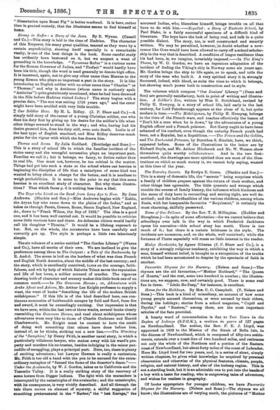The six volumes of a series entitled "The Gordon Library"
(Warne and Co.), have all merits of their own. We are inclined to give the preference among them to The Outpost : a Tale of the Backwoods, by R. Andi é. The scene is laid on the borders of what was then French and English North America, about the middle of the last century; and the story, which is excellently contrived, tarns on the courage, faith- fulness, and wit by help of which Babette Tricot saves the reputation and life of her lover, a soldier accused of murder. The vigorous drawing both of character and scenery makes this little book one of no common merit.—In The Gunroom Heroes ; or, Adventures with Arabs Afloat and Ashore, Mr. Arthur Lee Knight professes to supply a want, the want of books "describing the life of the modern British midshipman." If this life is of the kind described here, one con- tinuous succession of hairbreadth escapes by field and flood, from fire and sword, it mast be exceedingly exciting. Our impression is that we have seen, within the last two or three weeks, several books closely resembling the Gunroom Heroes, and read about midshipmen whose adventures were very like to those of Charlie Cochrane and Harold Charlesworth. Mr. Knight must be content to have the credit of doing well something that others have done before him, instead of, as he thinks, striking out a new line.—The Wrecking of the Samphire,' by Henry Frith, is another naval story, in which a particularly villainous lawyer, who makes away with his ward's pro- perty and murders his co-trustee, besides indulging in the minor pec- cadillo of smuggling, plays a principal part. Here, too, there is plenty of exciting adventure ; bnt Lawyer Howson is really a caricature. Mr. Frith is too old a band with the pen to be excused for the extra- ordinary metaphor of "fanned the flame of the deserter's doom."— tinder the Avalanche, by W. J. Gordon, takes us to California and the Yosemite Valley. It is a really striking story of the recovery of some horses from Digger Indians. The fight with the marauders is interrupted by the catastrophe of the avalanche ; and the catastrophe, with its consequence, is very vividly described. And all through the tale there moves an element of mystery, a skilful suggestion of something preternatural in the "Barber," the "lost Karma," the accursed Indian, who, blameless himself, brings trouble oa all that have to do with him.—Erpelled : a Story of Eastcote School, by Paul Blake, is a fairly successful specimen of a difficult kind of literature. The boys have the look of being real, and talk in a quite possible dialect. The story, too, is well constructed and smartly written. We may be permitted, however,:to doubt whether a new- comer like Gore would have been allowed to carry off a school scholar- ship in the way that is described. A condition of longer residence than his had been, is, we imagine, invariably imposed.—In The King's Thane, by W. G. Gordon, we have an ingenious adaptation of the incident of finding the Viking's ship in Norway some six years ago. Mr. Gordon brings the ship to life again, so to speak, and tells the story of the man who built it. A very spirited story it is, strongly flavoured, indeed, with blood, as snits the time to which it belongs, but showing much power both in construction and in style.






































 Previous page
Previous page